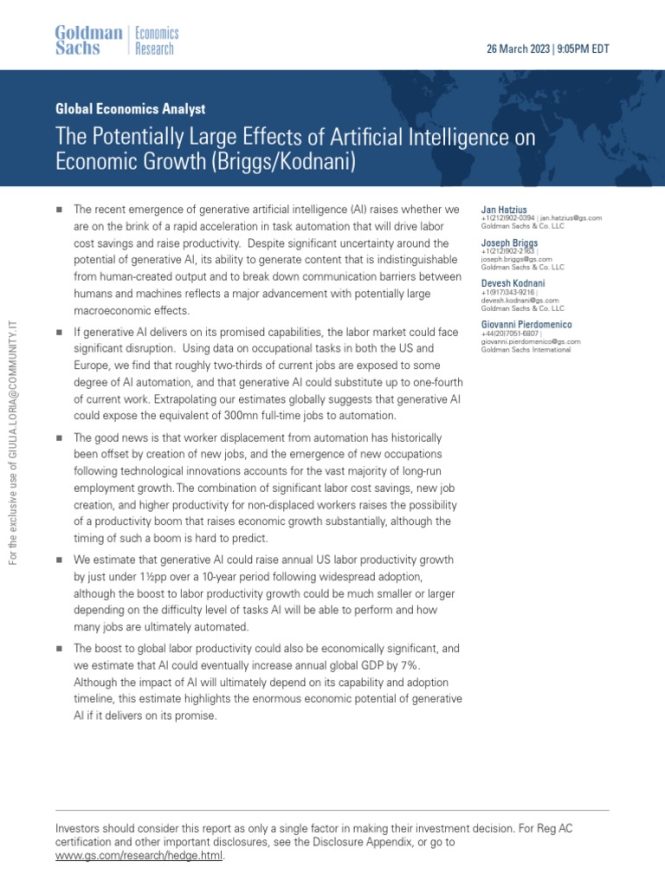

Artificial intelligence is profoundly impacting the global economy, revolutionizing industries, and reshaping the future of work. This transformative technology is automating tasks, creating new jobs, and fundamentally altering how businesses operate and how people work. This article will delve into the multifaceted ways AI is impacting the economy, exploring both the opportunities and challenges presented by this rapidly evolving technological landscape. We will examine how AI is affecting employment, productivity, and economic growth, and analyze the necessary adaptations for individuals and businesses in this new era. Furthermore, we will identify key strategies for adapting to the evolving economic landscape and ensuring a future where the benefits of AI are widely shared. This article is structured to provide a comprehensive understanding of the complex relationship between AI and the economy, starting with the fundamental concepts and progressing to specific case studies and practical implications.
Understanding the Fundamental Impact
The AI Revolution:
Artificial intelligence (AI) is rapidly transforming industries worldwide, from manufacturing and healthcare to finance and transportation. This transformative impact is driven by the increasing sophistication of algorithms, the availability of vast datasets, and advancements in computing power. AI is automating tasks previously performed by humans, streamlining processes, and enabling unprecedented levels of efficiency. This results in significant economic impacts, creating new markets, disrupting existing ones, and altering the nature of work itself.
The Rise of Automation:
One key aspect of AI’s economic impact is automation. AI-powered systems are increasingly capable of performing complex tasks, leading to increased productivity and efficiency in various sectors. This automation can potentially displace workers in certain roles, raising concerns about job displacement and economic inequality. However, it also opens up new opportunities for skilled labor in areas related to AI development, maintenance, and integration. For instance, businesses might require experts to program, train, and maintain their AI systems.
AI and Job Creation
New Roles and Skillsets:
While AI automation may displace some jobs, it also creates new roles and necessitates the development of new skillsets. The demand for professionals capable of developing, implementing, and managing AI systems is skyrocketing. This includes roles such as AI engineers, data scientists, machine learning specialists, and AI ethicists. Moreover, existing jobs are evolving, demanding a higher level of digital literacy and the ability to collaborate with AI tools. For example, the need for data analysts and data engineers is amplified as AI systems require massive amounts of data for training and optimization.
Reskilling and Upskilling Initiatives:
Governments and businesses are recognizing the importance of reskilling and upskilling initiatives to prepare the workforce for the challenges and opportunities presented by AI. This includes providing training programs and educational resources to equip individuals with the necessary skills for AI-related jobs. For example, the creation of new academic programs focusing on AI and data science is a promising approach to meet the growing demand for skilled professionals. Companies are also investing in internal training programs to enable their employees to adapt to the changing workplace.
Economic Growth and Productivity
Boosting Efficiency:
AI is profoundly boosting productivity in various sectors. Automated systems can work tirelessly, making processes more efficient and lowering production costs. This is particularly evident in manufacturing, where robots and AI-driven systems can perform complex tasks with speed and precision. This increased efficiency translates directly into higher output and potentially lower prices for consumers.
Driving Innovation:
AI is also fostering innovation in various industries, creating entirely new products and services that weren’t previously possible. For instance, the use of AI in healthcare is accelerating medical research, drug discovery, and personalized medicine, ultimately improving human health. These innovations can lead to significant economic gains in the long term.
Ethical Considerations and Challenges
Bias and Fairness:
One crucial challenge related to AI’s impact on the economy is potential bias in algorithms. If AI systems are trained on biased data, they may perpetuate and even amplify existing societal biases, leading to unfair or discriminatory outcomes. This issue requires careful attention to ensure fair and equitable application of AI in all sectors.
Job Displacement:
Another concern is the potential for job displacement as AI-powered systems take over tasks previously performed by humans. Addressing this issue requires proactive strategies for workforce adaptation, reskilling, and retraining initiatives.
The Future of Work in an AI-Driven Economy
Adaptability and Learning:
In the face of rapid technological advancement, adaptability and continuous learning are crucial. Individuals and businesses need to embrace a mindset of ongoing learning to adapt to the ever-changing landscape. Upskilling initiatives and online learning resources can significantly facilitate this adaptation.
Collaboration Between Humans and AI:
The future of work is not about humans being replaced by AI, but rather about humans and AI collaborating to achieve greater outcomes. Humans will be essential in providing oversight, creativity, and critical thinking that AI cannot currently replicate.
In conclusion, artificial intelligence’s impact on the economy is profound and multifaceted, presenting both opportunities and challenges. From automating tasks to creating entirely new industries, AI is reshaping the economic landscape. To harness the potential of AI for the betterment of society, proactive strategies for workforce adaptation, ethical considerations, and responsible development are crucial. By embracing continuous learning and adapting to this evolving technological landscape, we can unlock a brighter economic future. Learn more about the specific AI skills and training programs available to prepare yourself for the future of work at [link to relevant training site].